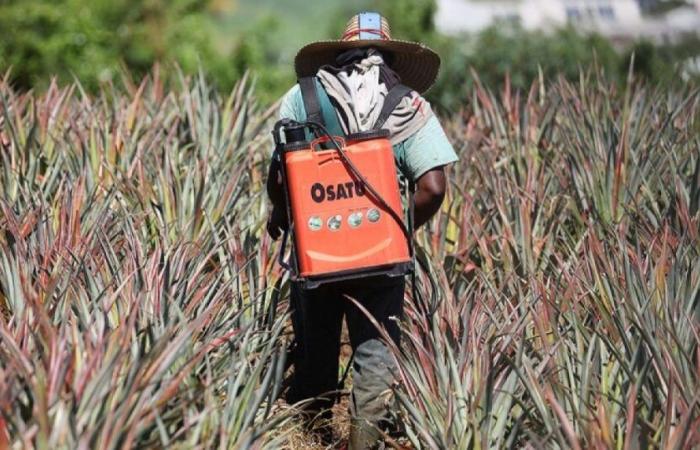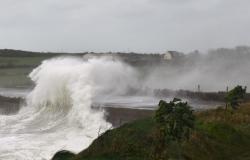
Réunion is the overseas department consuming the most pesticides, reveals the NGO Générations in a study published in early January 2025. According to these figures, in 2022, local farmers purchased 67.7 tonnes of pesticides including more than 20 tonnes of glyphosate . However, these data should be taken with caution. Since 2019, the use of phytosanitary products has started to decrease. The decline reached nearly 22% in 2024. “Farmers are looking for solutions adapted to local constraints” comments the FDSEA, the main agricultural union on the island (Photo: www.imazpress.com)
The association's map displays the results by year (from 2015 to 2022), based on the calculation of the municipal phytosanitary treatment frequency index (IFT). An estimate of the level of pesticide use based on crop rotation (crop distribution), type of practice (conventional or organic) and regional IFTs.
Based on data from the National Bank for Plant Protection Product Sales (BNV-D), this map “allows those responsible for health controls on drinking water to identify and target areas at risk”, specifies Générations Futures.
The map also allows us to look at three of the most criticized substances currently: glyphosate, classified as a probable carcinogen by the World Health Organization (WHO) but still authorized in the EU, prosulfocarb, a herbicide among the most sold in France, and flufenacet, from the PFAS family, better known as “eternal pollutants” and denounced for their harmful action on health and the environment due to their long lifespan. life in the soil.
Read also – The EU will renew the authorization of glyphosate for 10 years
– Réunion: overseas department with the highest consumption of pesticides –
In 2022, the island purchased 67.7 tonnes of pesticides including more than 20 tonnes of glyphosate.
The observation is the same for “2.4-d” – 2,4-dichlorophenoxyacetic acid which is used as an active substance in the composition of herbicides – purchased for 16.3 tonnes in Reunion.
In addition, according to data collected by Générations Futures, the average phytosanitary treatment frequency index in Reunion Island is 1.89.
It varies from 0 for the commune of Le Port to a maximum of 2.82 for the commune of Sainte-Suzanne.
On the Adonis map of herbicides, 12 municipalities appear in red due to average herbicide IFT (over the entire UAA – usable agricultural area) all greater than 2 and close to 2.91, the highest municipal herbicide IFT raised in France.
Fruit production (mainly bananas, pineapples and mangoes) in Reunion Island heavily uses pesticides (mainly fungicides and insecticides). They occupy 10% of the agricultural area (including 10% organic) and 25% of pesticide use on the island.
Finally, pesticides are also used in vegetable production which occupies 0.1% of the agricultural area and 1% of the total use of pesticides on the island.
– Sugar cane production dependent on the use of herbicides –
In Reunion, dominated by the cultivation of cane which occupies more than 53% of the agricultural area of the island (in 2022), production has by far the most impact on the quantities of pesticides used on the island.
Pesticide pressure is also concentrated in coastal areas.
“The molecules used for weed control and their metabolites contaminate the environment (and in particular water) and authorizations for use are gradually withdrawn (like S-metolachlor). The stakes are therefore high for the cane industry. sugar which must continue the implementation of alternative practices to chemical weeding to reduce the overall pressure of pesticides”, specifies the NGO.
– Indicators to take into account –
“According to figures from Génération Future, Réunion is not a unique territory in the use of phytosanitary products because it ranks in 49th position. The comparison between overseas regions must however be taken into account with caution because certain factors do not are not integrated and can vary depending on the territory (culture, climate, product characteristics)”, indicates the prefecture of La Réunion.
“Reunionese agriculture presents characteristics different from other DROMs. The territory has a production significantly higher than the latter (production of 360 million euros compared to 100 to 600 million for the other DROMs)”, adds the State services .
“These productions are subject to particular climatic conditions (heat, humidity), favoring the development of pests and diseases. This sometimes requires phytosanitary interventions to preserve the crops and guarantee a minimum yield to ensure a decent income for farmers,” specifies Guillaume Sellier, president of the Young Farmers.
– Pesticides reduced by 22% in Reunion –
If the card dates from 2022, from 2019, “we have reduced phytosanitary products and herbicides by around 22%”, notes Stéphane Sarnon, president of the FDSEA. You need to know “that when we use pesticides it is not a desire, it is by default”, he says.
As since then, “certain molecules used in phytosanitary treatments have been removed following European and national regulatory decisions aimed at reducing the environmental impact of agricultural practices”, indicates Guillaume Sellier.
“Significant efforts are being made to improve practices, in particular the reduction of IFT. In addition, research and support programs are underway to optimize the doses used and reduce applications,” continues the farmer.
Réunion is constantly looking for alternatives “to develop biocontrol techniques (use of natural products, natural predators or micro-organisms)”.
“A regional roadmap is also under construction for the year 2025 and will respond to local issues over the next six years, as part of the Écophyto plan,” adds the prefecture.
Five million euros were also validated as part of the PARSADA system (Strategic action plan for anticipating the potential European withdrawal of active substances and the development of alternative techniques for crop protection).
“These are the IDECAS project on the weeding of sugar cane and the SA-IRA project on pests of fruits and vegetables, the aim of which is to bring out innovative solutions allowing a significant reduction in the use of pesticides”, specifies the State.
Efforts to reduce the use of pesticides in Reunion are real and progressing, but these solutions must be adapted to local constraints.
ma.m/www.imazpress.com/[email protected]
Pesticides, Agriculture, Reunion





